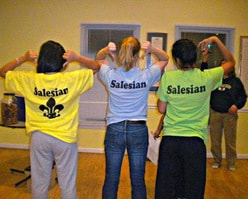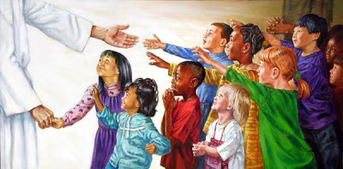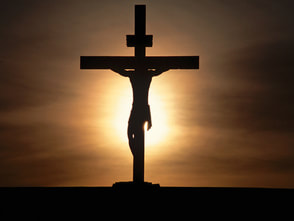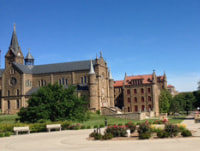|
As I finally sit down to write this post, I once again have that awful realization that I’ve let my tendency to procrastinate get the best of me. And, once again, I beat myself up over it because I know I’ve failed to follow through and honor my word: “You have a college degree! You should know how to properly manage your time! You’re better than this! Stop being such a failure!” and on, and on. It’s a cycle of self-deprecation that so many of us fall into, particularly young adults.
When I did some investigation on St. Jerome, whose feast is today, I laughed at myself over that train of thought. Most well-known as the biblical scholar who revised the Latin Bible (generally known as the Vulgate), this Doctor of the Church was also incredibly hard on himself when he failed. Butler’s Lives of the Saints says of Jerome: He was, as someone has said, no admirer of moderation whether in virtue or against evil. He was swift to anger, but also swift to feel remorse, even more severe on his own shortcomings than on those of others. A pope is said to have remarked, on seeing a picture of Jerome striking his breast with a stone, "You do well to carry that stone, for without it the Church would never have canonized you." I suppose we young adults are in good company when we, too, are hard on ourselves for missing the mark. It’s really no wonder Catholic young adults have such difficulty accepting those times we fall flat on our faces. Fresh out of our academic careers, whether high school or college, we’re used to very high expectations on our performance. We tend to gauge our self-worth on quantifiable “goals”: our GPAs, extracurricular involvement, “likes” on Facebook, retweets on Twitter, number of job interviews, etc. Every time we miss the mark we’ve set for ourselves, it somehow translates to utter personal failure. This, of course, is foolishness. It’s all well and good to be involved and occupy our time with things. St. Jerome himself said, “Be ever engaged, so that whenever the devil calls he may find you occupied.” It’s another thing, though, to obsess over being occupied and, thus, increasing our chances at “being successful”. We know it in our heads, but fail to grasp it in our hearts, often at great detriment to our interior lives. All of these “real world” struggles have a profound effect on our spiritual well-being. As soon as we begin to think poorly of ourselves for underperforming in worldly things, we become overly critical of our spiritual shortcomings. We keep failing at (insert your habitual sin(s) of choice) and beat ourselves up every time. This can be even worse for the soul than the particular sin itself; we begin to believe that we’re not worthy of being fixed. So what is one to do? I’m no spiritual guru, but I can share a few things that continue to help me overcome this recurring sense of unworthiness. 1. Daily Prayer- It goes without saying that daily prayer is essential. Even if you start with “Hey God, it’s me again. I’m sorry I keep failing at this. Please help”, you’ll reap the benefits immediately. Like with any other relationship, frequent dialogue is of primary importance. 2. Mass- The Eucharist is literally the greatest physical thing in the world: Christ in the flesh. We have the opportunity to receive Him every single day; take advantage of it. And while you’re at it, take a leap of faith and try out… 3. Reconciliation- Yes, the oft-dreaded Confessional. Admittedly, I absolutely hate going—but I sure love leaving! While it’s hard to do, it’s like anything else in life: the greatest reward comes from the greatest sacrifice. Take a leap of faith if you’ve been away for a while. The “spiritual car wash” really is one of the greatest gifts God offers us. 4. Spiritual Direction- Regular dialogue with a spiritual guide provides an objective view of our journey. It takes a level of openness and vulnerability, but having someone to walk with gives us much-needed encouragement and accountability. 5. Patience- St. Francis de Sales said it best: “Have patience with all things; but, first of all, with yourself.” We’re humans, and fairly young ones at that. The expectation we place on ourselves to be perfect is so unreachable because we’re inherently imperfect. We’re constantly developing, growing, falling down and getting back up again. It’s only God who can make us perfect; we just keep getting in His way. The next time you go all St. Jerome on yourself, drop that stone and look instead to the One who is Perfection itself. He’ll help you back up on your feet every time. Ad Infinitam Dei Gloriam Jay Schaefer is the Webinar Associate for the Catholic Apostolate Center and a civil engineer in the Baltimore Area.
0 Comments
9/25/2014 Discernment Story: How one volunteer came to hear her life calling through serviceRead NowI believe that my two years of service had a 100% direct impact on my discernment process and decision to enter the Daughters of Mary Help of Christians, more commonly known as the Salesian Sisters of St. John Bosco or just the Salesian Sisters. In fact, I would go so far as to say that God sent me to volunteer at this particular High School to reveal my vocation.
I wanted to do a year of volunteer service right out of high school, but did not have the opportunity to do so. I learned that I found great joy in serving others through my social outreach group in high school and had a strong desire to give more time, energy, and direct focus to volunteering. Come April of my senior year in college, I found myself without a plan for the following year and the idea of doing a year of service re-entered my mind. I visited theCatholic Volunteer Network website and found the online RESPONSE directory,which helped me to narrow down my search to the type of program I was interested in with the type of support that I needed. This is where I learned about the Cristo Rey Network of schools and truly the next chapter of my life began. The Cristo Rey Network is a high school model that offers low income families the opportunity to send their students to Catholic college prep high schools. How is this possible when most Catholic high schools are quite expensive, you might ask. The school partners with local corporate businesses, organizations, universities, hospitals, law firms etc where the students will work five days out of the month to offset their tuition cost. (Click here to learn more and see me in my classroom at minute 4:37.) It took a leap of faith to go to Don Bosco Cristo Rey High School (DBCR) in Washington, D.C. because I would be joining the Salesian Domestic Volunteers (now called Salesian Home Missioners) in their first year as a volunteer program and I would also be the only volunteer placed at DBCR. I was going to be a pioneer both in my volunteer program and placement in the school. DBCR was also only in its fourth year of existence and still responding to the challenges of being in the “start up” period. It would be two years of learning and growing for all of us. During my first year of service at Don Bosco Cristo Rey High School I worked in the Youth Ministry and Faith Formation Department while also teaching two sections of junior theology. In my second year I taught a full course load, five sections, split between freshmen and junior theology as well as assisting the youth ministry team. Within those classrooms and the small youth ministry office God called me to be a Salesian Sister. I learned a lot from working side by side with Fr. Abraham Feliciano, SDB (Salesians of Don Bosco). In him, I witnessed the everyday charism of the Salesians and joyful service to the young who are most in need. Fr. Abe loved those students with his whole heart and they knew it. They knew that they could rely on him to crack a joke and brighten their day or that they could come to him with serious problems and he would lead them to Jesus. I learned that the heart of the Salesian charism is a daily encounter with Christ in and through our students and hopefully reciprocated as we open ourselves to be an image of Christ for them. I spent countless afternoons in that youth ministry office, surrounded by young people, laughing so hard I thought I would burst! I also learned how to be with them in and through the struggles they encountered in their daily lives. (Click here to see the class of 2014 reading excepts from MLK Jr.’s “Letter from Birmingham Jail”. These are some of the many students who have overcome great challenges in their live and that I had the privilege to see Christ in everyday. ) While working with these students, I lived in community with volunteers from several different programs. We were a mixed bag of Franciscans, Salesians (that’s me!), Columbans, and volunteers from the Catholic Volunteer Network. Over the course of my two years there we ranged from a community as small as four to as large as nine. The Franciscan style of living in community is simplicity. On an economic level, we made do with all second hand furniture and shopped frugally for our needs. We usually did not buy Ziploc bags, for instance, because we could reuse Tupperware containers instead. As a part of my volunteer program, I did not have a car but I received a stipend each month for food and transportation. On the community level, simplicity meant that we relied on each other. Sometimes that took the form of practical matters, such as grocery shopping or mopping up a flood in the basement. Other times it took a more personal form as we relied on one another for support and friendship. Now that I am living in community with the Salesian Sisters, I look back on my time in community as a formative period. In learning how to live with different people of various personalities, I learned how to recognize the gifts that all members can bring to community and I was able to learn more about myself as well. As my two years of volunteering came to a close, I decided to stay and accepted a full time paid teaching position at DBCR. But I had an inclination, even then, that God was calling me to something more, something deeper. God had gifted me with two wonderful and difficult years at the service of a school and students truly in need. But His ultimate goal was not for me to stay at one school and with one group of students, He wanted to expand my horizons of service and the dimensions of my heart. I had the opportunity, while Fr. Abe was at DBCR, to attend daily Mass in our school chapel. This daily encounter with Christ in the Eucharist helped me to see Christ every day in the young people and opened my heart for the possibility of deeper relationship with Him. When the Salesian Sisters came for our vocations assembly I heard God’s voice speaking directly to me saying, “This is it!” I must be honest, my first reaction was irritation. “Oh very funny God! Here I am sitting through the same vocation talk presented to all five of my Theology classes. Aren’t you supposed to be speaking to the students right now?! Leave me alone!” But because our God is good and patient, He didn’t leave me alone. After three years in Washington, D.C., He called me to move to New Jersey where the formation house of the Salesian Sisters is located. It took some convincing on God’s part to show me that it was not just DBCR where He wanted me to serve, but anywhere the Salesians are and with all young people tho whom He might send to me. The Salesian Sisters dedicate their whole selves to God in the service of young people through education, parish catechism, youth centers, and anywhere young people may be found. St. John Bosco and St. Mary Mazzarello (our founders) shared the joy of Christ with every young person they met providing for them a home to feel welcome, a school to prepare them for life, a Church to evangelize, and a playground for them to make friends and have fun! For me, what started as just a year of service post college opened the doors of my heart for Christ to call me to my life’s vocation. I am now half way through my first year of formation and if I had to identify one overriding emotion, it would be deep a sense of peace. For more information on vocations, be sure to check out the Catholic Apostolate Center's Vocational Discernment Resources Kelly Schuster is a former Salesian Home Missioner and is currently an Aspirant with the Salesian Sisters This post was originally written and posted on the Catholic Volunteer Network Blog. For more Catholic Volunteer Blog Posts please visit the CVN Blog Page. The Catholic Apostolate Center is proud to partner with the Catholic Volunteer Network by developing faith formation resources for volunteers and alumni, assisting in its efforts to provide and advocate for faith-based volunteerism and collaborate in many additional ways. In my kindergarten class, there is one little girl who loves to ask questions about faith. After going to Mass in the chapel last week, she asked me, “Who was the almost naked man on the wall in pain?” I smiled and answered, “Jesus, because he loves you very much.” While contemplating this, a few minutes went by until she had another question. She asked, “Why do they give cookies at church and why didn’t I get one?” These and many other inquiries were made that day, so it struck me: how can we as faithful Catholic adults help young children better understand our traditions, history, and faith? We must understand as children do.
In the Gospel of Matthew, Jesus said, “Let the children come to me, and do not prevent them; for the kingdom of heaven belongs to such as these” (Matthew 19:14). Only with the virtue and openness of a child can one truly have eternal life. Similar to my student who was so curious about the Mass, we as adults of faith must remember to love as children love, and to eagerly ask questions as children ask them. Having a burning desire to love and serve God is something that so many adults yearn for, but so few are able to achieve. Often times, children can be an example to adults of unconditional and innocent love for others. Understanding our faith is difficult at times, and it is often hard to see the good in difficult situations. We get caught up in the stressful details and hardships that come with living our daily lives, and frequently become over-scheduled and sluggish in the practice of our faith. As “grown-ups” we have so many things on our minds, and deepening our understanding of God’s love and mercy is easily forgotten and overlooked. Instead of grumbling about an overdue bill or the laundry list of things to do, stop and think about how lucky we are to have a job or a family that loves us. Children love their parents and caretakers for simple things like good food, a comfortable bed, and new clothes. While we are forgetting that the simplest actions mean the most to children, we also forget that the simplest moments mean the most to God. A quick prayer of gratitude in the morning, for a traffic-less commute or a child’s hug goodbye goes a long way…God notices every grateful moment. Our Holy Father, Pope Francis, believes that education and teaching provides knowledge of beauty, truth, and goodness. Inspiring others with a desire to learn about our faith is crucial in the life of a Catholic–whether you are a teacher, parent, or role model. Children are innocent and believe what they see. When they see parents and teachers serving God and the Church, they desire to imitate them and do the same. We must be like children in order for them to understand the Lord, ask questions, make mistakes, get messy…and always know that God loves us. Krissy Kirby is a Kindergarten teacher for the Archdiocese of Washington D.C. In today’s first reading, we hear about God’s work in our lives and how it is by His grace that we overcome our faults and our failures. In his first letter to the Corinthians, St. Paul lays his own life out before us, yet again, as an example of how we must become apostles of Christ, spread His Gospel, and renew ourselves in Him.
Last of all, as to one born abnormally, he appeared to me. For I am the least of the Apostles, not fit to be called an Apostle, because I persecuted the Church of God. But by the grace of God I am what I am, and his grace to me has not been ineffective. Indeed, I have toiled harder than all of them; not I, however, but the grace of God that is with me. Therefore, whether it be I or they, so we preach and so you believed. (1 Corinthians 15:8-11) St. Paul persecuted Christians until he heard God’s voice calling him to open his eyes and recognize Christ. He was like us—sinners in a constant battle between temptation and living out the Gospel message. And yet, St. Paul was knocked off of his horse and raised to new life in Christ. He does not attribute his new life and his faith in Christ to his own willpower, but rather recognizes that it is through the grace of God that he is able to enter into the Body of Christ. It is through the grace of God that he is able to preach the life of Christ. As he says so poignantly: “By the grace of God I am what I am.” These are important words to live by. We are often caught up in the traditions, stereotypes, struggles, and joys of our earthly lives. What truly grounds us in our humanity and in our faith in Christ is that, by the grace God, we are who we are. God gives us the grace to go out into the world and evangelize, to spread the Gospel, to live as Jesus taught us. However, by nature of our humanity and by the gift of free will, we have the choice to live as we want to live, to sin, to grow in faith, to make war, to make peace. We, guided by the Gospel and the Church, are called to ask God for the grace to evangelize, the grace to resist temptation, and the grace to live as Christ lived. We are first opened up to the grace of God through our baptism, a topic discussed in Tuesday’s blog post. We enter the waters of baptism and die to sin, arising to new life in Jesus Christ. In this sacrament we are called to live out Christ’s Gospel message. As our Holy Father, Pope Francis, said: “I am a sinner, but I trust in the infinite mercy and patience of our Lord Jesus Christ.” Receiving the grace of God is not a one-time thing, we must continue to seek it every day and renew ourselves in Him. It is not a one-time thing and it is not easy, but we have the beautiful example of Mary the Mother of God and all the angels and saints and we must rely on their strength and their intercession in asking for God’s grace. Archbishop Fulton Sheen once said , “Mary was not full of grace because she was beautiful; she was beautiful because she was full of grace.” Who better to ask for help than a woman so blessed with the grace of God that she carried His son in her womb for nine months, watched him grow in his ministry, and sat at his feet as he suffered and died for us? The Second Vatican Council’s Dogmatic Constitution on the Church, Lumen Gentium, tells us that “…in suffering with Him as He died on the cross, [Mary] cooperated in the work of the Savior, in an altogether singular way, by obedience, faith, hope, and burning love, to restore supernatural life to souls. As a result she is our Mother in the order of grace.” It is important to examine our consciences and call to mind our sins, asking Mary to intercede for us. We pray that we might be given God’s grace to live our lives as Christ did, to go out and preach the Gospel in the example of St. Paul, and to lead others to Christ. Nicholas Shields is a young professional from Washington, D.C. Have you ever wanted to start over? “My diet starts on Monday...” “My New Year’s Resolution of not drinking soda failed, so I’ll give it up for Lent in a couple of months...” “I’ll start not hitting the snooze button on the first of the month.”
A fresh start... Our society always seems to be longing for a “fresh start.” There’s a sense of pride and victory when we can commit to a new beginning. But why is it so difficult to remember that as Christians, by virtue of our baptism, we are called to a fresh start each day with Christ? Our first reading today reminds us that we are members of the Body of Christ our baptism. “For in one Spirit we were all baptized into one Body… and we were all given to drink of one Spirit” (1 Corinthians 12:13). The vocation we receive in baptism is not to lay dormant in our hearts; rather, it is a vocation that we should choose to live out each day. When we choose to intentionally live out the promises of our baptism, we are renewed by its waters and are given a “fresh start” to live as the Christians we long to be. In Christ’s love, it is never too late for a new beginning. We see this in today’s Gospel reading, when Jesus brings the only son of a widow back from the dead. And do you know what his call to new life was? Jesus said, “Young man, I tell you, arise!” (Luke 7:14). This is our call, too! Jesus says this to our hearts, “Young man, I tell you, arise!” “Young woman, I tell you, arise!” The fulfillment of our call is the way we live out the radical nature of our baptism. The Christian life is not easy, but that is why we are called each new day to “arise” and fulfill the promises of our baptism, “[serving] the Lord with gladness” (Psalms 100:2). What are you going to do today as Jesus calls you to “arise?” This is your fresh start. It may not seem like the perfect day to begin anew, but as Christians we know that today–this ordinary day–has been given to us by God and we are being called to “arise!” You have been called, you have been chosen. So “arise,” my friend, and let this new day be a new offering to our Lord. We can begin this fresh start by praying a Renewal of our Baptismal Promises, that explicitly remind us of our call as Christians. Please join me in praying this today. The Renewal of Baptismal Promises Taken from the Roman Missal, Third Typical Edition Do you renounce Satan? I do. And all his works? I do. And all his empty show? I do. Do you believe in God, the Father almighty, Creator of heaven and earth? I do. Do you believe in Jesus Chris, his only Son, our Lord, who was born of the Virgin Mary, suffered death and was buried, rose again from the dead and is seated at the right hand of the Father? I do. Do you believe in the Holy Spirit, the holy Catholic Church, the communion of saints, the forgiveness of sins, the resurrection of the body, and live everlasting? I do. And may almighty God, the Father of our Lord Jesus Christ, who was given us new birth by water and the Holy Spirit and bestowed on us forgiveness of our sins, keep us by his grace, in Christ Jesus our Lord, for eternal life. Amen. Alyce Anderson is a recent graduate of Texas A&M University. She is currently pursuing her Masters in Secondary Mathematics and Special Education while teaching at a local school in Washington, DC. On September 14th, we celebrate the feast day of the Exaltation of the Holy Cross. In the Gospel of John, Jesus tells us: “No one has greater love than this, to lay down one's life from one's friends” (John 15:13). That love is never more evident than our Lord's passion and death on the Cross. By that Holy Cross, we have been redeemed. Jesus Christ foretold his Passion to the Apostles, instituted the Eucharist at the Last Supper, and fulfilled God's plan for human salvation at Calvary upon that Holy Cross. This, my friends, is the greatest love ever known to humankind; by the grace of God, we will come to know the fullness of God's love in eternity. The promise of eternal salvation was made possible upon that Cross and we, as Catholics, are called to pick up our cross and follow Christ daily. This is a very hard thing to accomplish in today's world.
Jesus gave us the Holy Spirit at Pentecost to guide and strengthen us while following his commands. Paul tells us: “I have the strength for everything through him who empowers me” (Philippians 4:13). Jesus Christ empowers us with the Holy Spirit today just as he did with the Apostles. It is exactly that God-given power that we need in today’s often secular world to preach Christ crucified and “fight the good fight,” as St. Paul says. For if we profess Christ without recognizing and living his sacrifice on the Cross, we cannot be disciples of the Lord. Peter found that out when Jesus admonished him after the foretelling of his passion and death. I keep written on my desk calendar in my office and in my daily liturgical calendar, a Latin phrase that I think summarizes this idea: Lex orandi, Lex credendi, Lex vivendi - As we worship, So we believe, So we live. As we worship, so we believe, so we live. We must, through worship and prayer, “Love the Lord, your God, with all your heart, with all your soul, and with all your mind” (Matthew 22:37). We must believe all that Jesus has taught us, that he is our Lord and Savior, and that he suffered and died so that we may live. We must live out our faith in what Jesus has called us to do by spreading the good news and picking up our cross and following our Lord. This is not an easy task. It isn't easy being a Christian. Christ never said it would be easy. Being a Christian is not just being a member of a religion, it is our way of life. We live the faith Christ gave to us. When we struggle with this, when we get lazy or complacent with our prayer time, or if we need a reminder of just how much we are loved and what our calling is, we need only to gaze upon the Holy Cross. We can also reflect on the Prophet Isaiah, when he told us exactly what Christ has done for us and for the salvation of man: "Yet it was our pain that he bore, our sufferings he endured. We thought of him as stricken, struck down by God and afflicted, but he was pierced for our sins, crushed for our iniquity. He bore the punishment that makes us whole, by his wounds we were healed" (Isaiah 53:4-5). Brothers and sisters in Christ, we celebrate the Feast of the Exaltation of the Holy Cross.” Remember, worship, believe, and live in the glory of Christ crucified! Mark A. Straub Sr. is a member of the Knights of Columbus and president of the parish council of Our Lady of the Woods Parish in Woodhaven, Michigan. When he broke open the fifth seal, I saw underneath the altar the souls of those who had been slaughtered because of the witness they bore to the word of God. They cried out in a loud voice, "How long will it be, holy and true master, before you sit in judgement and avenge our blood on the inhabitants of the earth?"
(Revelation 6:9-10) As Christians, we are tasked with following the teachings of Christ over those of the world. Doing so often puts us at odds with the latter, amid accusations of fostering inequality, forcing our beliefs on others, adhering to obsolete traditions, or getting involved in matters that do not concern the Church. It’s true that there have been many efforts over the centuries to silence Christians—persecution is nothing new to the Church—but Jesus had warned that believing in Him would not make us popular in the eyes of the world (John 15:18, c.f. 1 John 3:13, 2 Timothy 3:12, 2 Corinthians 4:8-11, Revelation 2:10). The most recent evidence of persecution can be seen in the ongoing ISIS attacks in the Middle East, where people who have been living in areas that have been Christian for nearly 2,000 years are suddenly being forced to convert or die. Though this grave situation is happening half a world away, it is critical that we do not remain apathetic during our daily routines. Cardinal Donald Wuerl of Washington, D.C., in his closing remarks at The Catholic University of America’s Mass of the Holy Spirit, warned that human atrocities can occur if people remain silent about the plight of others. As Christians, we are all united in the body of Christ through our baptism (see 1 Corinthians 12:12-26, c.f. Romans 12:15) and as such, we must care about what affects another member. To that end, Saint Paul writes, “If one member suffers, all suffer together; if one member is honored, all rejoice together.” While it is easy to forget the persecution occurring beyond our borders in our comfortable day-to-day activities, we cannot simply be sorry for the terrible suffering endured by others—these are truly our brothers and sisters in the faith who need our continuous compassion and support! We may not be able to fully imagine the terror they are experiencing but we can at the very least offer prayers and sacrifices (i.e. suffer with them) on their behalf. Never doubt the value of prayer. It remains a most powerful means of comfort, hope, and strength from and in God. Pope Francis has stressed that “prayer, in the face of a problem, a difficult situation, a calamity…is opening the door to the Lord, so that He can do something. If we close the door, God can do nothing!” When we offer our prayers, we are also expressing our trust that God is more powerful than the problems presented by the world—He can bring good out of evil—as we read of many biblical miracles when God’s people prayed for deliverance and forgiveness. When we pray, we remember the needs and welfare of our brothers and sisters in the faith and become united through our communication with God. With sincerity and reverence, the words spoken aloud or in one’s mind and heart are infinitely more effective than simply pitying the plights of others. In spite of all the terrors and injustices reported to and/or experienced by us each day, let us never forget to hope! Suffering is indeed a part of life, but by the Passion and death of Christ, salvation for the world has been achieved. We can take comfort and rejoice that our own suffering can be joined with His and offered up as gratitude for His willing Sacrifice: because of His subsequent resurrection, we too can look forward to being raised. What will separate us from the love of Christ? Will anguish, or distress, or persecution, or famine, or nakedness, or peril, or the sword? As it is written: "For your sake, we are being slain all the day; we are looked upon as sheep to be slaughtered." no, in all these things we conquer overwhelmingly through him who loved us. For I am convinced that neither death, nor life, nor angels, nor principalities, nor present things, nor future things, nor powers, nor height, nor depth, nor any other creature will be able to separate us from the love of God in Christ Jesus our Lord. (Romans 8:35-39) Thomas Wong is an undergraduate student at The Catholic University of America and a member of the Catholic University Knights of Columbus. Just last summer on Copacabana Beach, at World Youth Day, Pope Francis remarked, “The Church is counting on you... The Pope is counting on you!” Youth in the Church today often feel marginalized, alone, or worst of all- downright ignored. However, it is our calling as baptized Catholics to reverse this trend, and in rural southern Indiana, an unlikely group of Catholics are striving to do just that.
I spent the summer at Saint Meinrad Archabbey, a Benedictine monastery in Indiana, working for One Bread One Cup, a liturgical leadership youth program that forms high school students in the liturgy and helps them to integrate the Word, Sacrament, and Mission of the Church into their lives. Over seventy monks welcomed twenty college interns and hundreds of high school students and youth ministers to their home. However, they did much more than welcome us to their home. For centuries, Benedictine monks have been known in a special way as guardians of the rich liturgical patrimony of the Church. And guess what they did with it? They gave it away, they gave the youth the most precious gift that they have, telling them to go back to their parishes and implement what they have been taught, ranging from how to be an EMHC, to Cantor, to liturgical artist. However, it was not so much being taught how to do these things, as much as helping the youth to realize and use their God given gifts to build up His Kingdom. Whenever I think of the mission of One Bread, One Cup, I always see its mission epitomized by Matthew, Chapter Ten, when Jesus commissions and sends out the apostles to minister, to go and proclaim the kingdom of heaven. An important aspect of the New Evangelization is helping youth rediscover or discover for the first time the richness of the Gospel. However, once teens join a youth group and appear to begin to be engaged, what happens then? Pope Francis at World Youth Day said, “Sharing the experience of faith, bearing witness to the faith, proclaiming the Gospel: this is a command that the Lord entrusts to the whole Church, and that includes you…” Therefore, part of the whole Church’s mission is to make it known that teenagers are not only called to be disciples of Jesus, but to be apostles; to partake in the apostolic mission and responsibility of Jesus and the Church. Spending the summer ministering to older high school students from across America, from Louisiana to Michigan, has shown me one very effective way at helping youth to recognize their calling to be apostles, and to discover and then use their God given talents to participate in a certain liturgical ministry. Everything the Church does flows from one thing- the celebration of the Eucharist. Therefore, if we are trying to keep youth in the Church, or help them to realize their calling to be apostles, why would we not involve the youth in the most important work that the Church does? If youth understand the liturgy and participate in it, then they will be able to understand and participate in the Church, because the liturgy is the greatest teaching tool the Church has. “Renewing the Vision,” a landmark document on youth ministry by the USCCB says evangelization, “calls young people to be evangelizers of other young people, their families, and the community.” Once youth become involved in the liturgy and understand it, it becomes the natural next step for them to evangelize others and in my experiences and probably yours, it becomes much more likely that they will feel a part of the Church and stay in the Church. Conor Boland is a College Ministerial Intern for One Bread One Cup, at Saint Meinrad Seminary & School of Theology and is an undergraduate at the Catholic University of America. |
Details
Archives
July 2024
Categories
All
|
About |
Media |
© COPYRIGHT 2024 | ALL RIGHTS RESERVED








 RSS Feed
RSS Feed